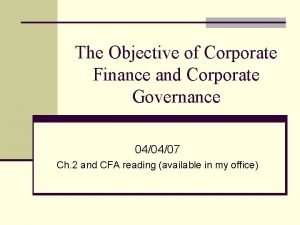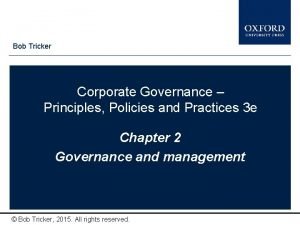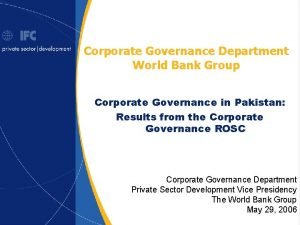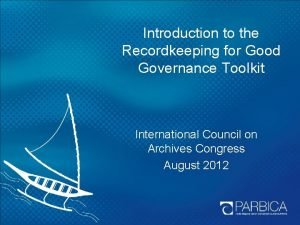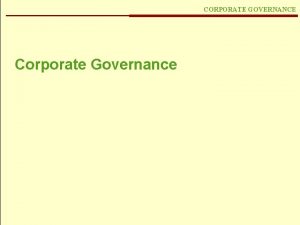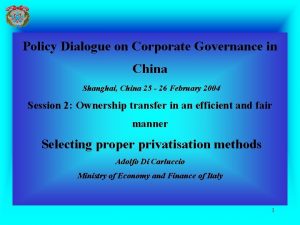Policy Dialogue on Corporate Governance in China The









- Slides: 9

Policy Dialogue on Corporate Governance in China The Independence of the Board – Why and Where Independence Matters? Clarence Kwan February 25 -26, 2004

Where & Why Independence Matters? • • • Independence Balance of Power Potential Structural Conflicts Independent in Fact ≠ Independence in Action Independent Directors ≠ Independent Board ≠ Effective Board

Independence Balance of Power The Corporate Governance Triangle C AN M R FO PE EG Y AT R ST S & R TE G N LO & ES N SI R PL A M T H G SI R O VE Y LI C PO BU R MANAGEMENT N IO AT N O IC N TI U TA M M EN O C ES ION R T EP EC EL N N IN G E BOARD OF DIRECTORS MEDIATION & CONFLICT RESOLUTION * INVESTMENT DIVIDENDS & GROWTH SHAREHOLDERS DISCLOSURE 3 INVESTOR RELATIONS © 2004 Deloitte & Touche Tohmatsu

Potential Structural Conflicts Primary Cause Potential Victims Potential Conflicts Dominant Minority Shareholders Related-Party transactions Inequitable shareholders’ rights Dominant Manager Unreasonable agency costs Abusive use of corporate assets “Black Box” operations Shareholders as a whole Dominant All Shareholder Stakeholders as Manager All of the above Independent check and balance is necessary.

Independent in Fact ≠ Independence in Action Independent in Fact Not independent if: • Employee • Family of executives • Direct compensation • Auditor relationship • Interlocking directorship • Business relationships (Current or during the Look-Back period) Independent in Action Depends greatly on: • Who nominates • Level of empowerment • Direct access to information Peers Review by an association of • Organized Direct access to shareholders Independent Directors • Leverage from auditors and outside experts • Compensation scheme • External Scrutiny Voluntary Comply or Explain Mandatory

Independent Directors ≠ Independent Board Cultural Difference in Decision Making Priorities 法(feng) Legality 情 Relationship 理(li) Reasonableness 理 Reasonableness 情(qing) Relationship 法 Legality

Independent Directors ≠ Independent Board Cultural Difference in Group behaviors 會而不議 hui er bu yi 議而不決 yi er bu jue 決而不行 jue er bu xing Meet but not discuss (Face saving) Discuss but not decide (Guanxi not clear) Decide but not act (Passive resistance) 會議 = Meeting = Meet (hui) & discuss (yi)

Independent Board ≠ Effective Board Balancing Compliance with Performance • “Bad corporate governance, i. e. a lack of board independence, can ruin a company, but cannot, on its own, ensure its success. ” • An effective board must also focus on corporate performance in terms of strategy and value creation. It must address four key strategic issues to insure success: v. Choice and clarity of strategy v. Strategy execution v. Ability to respond to abrupt changes v. Ability to undertake successful M&A Source: Enterprise Governance – International Federation of Accountants 2003

Closing 1. Board independence is essential for maintaining the balance between the interests of management and shareholders 2. We must create an enabling environment for independent directors to truly act independently 3. We must balance corporate governance with value creation. 9 © 2004 Deloitte & Touche Tohmatsu
 Objective of corporate governance
Objective of corporate governance Congratulating expressions and responses
Congratulating expressions and responses Bob tricker corporate governance
Bob tricker corporate governance Corporate governance triangle
Corporate governance triangle Corporate governance department
Corporate governance department Corporate governance in strategic management
Corporate governance in strategic management Global corporate governance forum
Global corporate governance forum It means openness a willingness by the company
It means openness a willingness by the company Cadbury committee report ppt
Cadbury committee report ppt Corporate governance tool kit
Corporate governance tool kit
